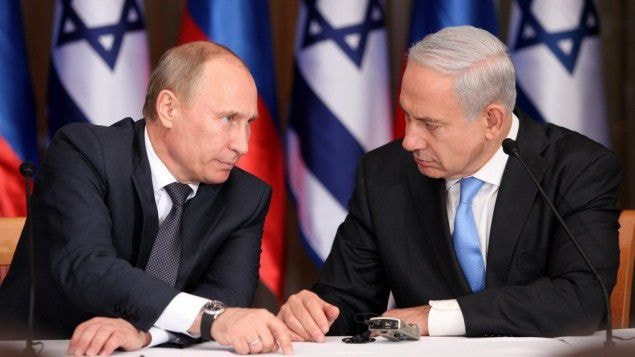Russia Delivers S-300 Missiles to Iran: Israel's Tough Choice
(Baonghean) - "It is the choice of the Israeli leadership, they have the right to do what they think is beneficial" - this is the answer of Russian President Vladimir Putin in a recent television interview about the possibility of Israel supplying weapons to Ukraine in response to Russia's decision to lift the ban on supplying S-300 air defense missile systems to Iran. With this statement, Israel can understand that it is impossible to pressure Mr. Putin to change his decision, and Israel's right to decide will only be how to behave in its relationship with Russia.
| RELATED NEWS |
|---|
After expressing an attitude of “doing whatever Israel wants”, Russian President Vladimir Putin did not forget to warn about the consequences of this action, that the weapons that Israel transfers to Ukraine will only increase tensions and the number of victims, and “the result will be the same”. Mr. Vladimir Putin also emphasized that Israel’s actions will undermine efforts to bring peace to Eastern Ukraine.
Of course, the Kremlin chief fully understood that the threat to Israeli Prime Minister Benjamin Netanyahu was in response to Russia lifting the ban on supplying S-300 air defense missile systems to Iran. Therefore, Mr. Putin dismissed Israel's concerns by asserting that the S-300 is only a defensive weapon, so it will not pose any threat to the security of Israel or other countries in the Middle East.
Previously, on April 18, Russian Deputy Defense Minister Anatoly also emphasized that Russia does not face international barriers to providing Iran with the S-300 air defense missile system, because the S-300 is not an offensive weapon.
 |
| Russian President Vladimir Putin and Israeli Prime Minister Benjamin Netanyahu. |
Iran is now hoping to receive the Russian S-300 air defense missiles by the end of this year. However, Russia has not promised a specific date, saying that it depends on the capacity of the factories. However, it is certain that Israel has not influenced Russia's decision on this deal, the remaining question is whether Israel will act on its threat to supply weapons to Ukraine. In fact, the connection between Russia's supply of S-300 to Iran and Israel's supply of weapons to Ukraine dates back to the past.
In 2007, Russia signed a contract to sell Iran the S-300 system for a contract worth up to 800 million USD. However, this contract was frozen after the UN Security Council passed a resolution imposing sanctions on Iran over its controversial nuclear program. Although not publicly announced, Israel's subsequent refusal to supply weapons to Ukraine and Georgia is considered a "reciprocation" to Russia. Therefore, in theory, once Russia returns to the contract to supply S-300 to Iran, Israel has every right to supply weapons to Ukraine.
Vladimir Putin himself acknowledged this “right” of Israel, but whether Israel will exercise its “right” or not is another matter, and Israel will certainly have to consider carefully if it really intends to take this reckless step. Israel’s opposition to Russia is based on concerns about the threat of the S-300 missile defense system to its security. With the ability to track up to 100 targets and attack 12 to 36 targets at the same time, and the ability to effectively destroy all airborne targets such as aircraft and ballistic missiles, the S-300 system that Russia will provide to Iran makes Israel “restless”, which is understandable.
However, the difference between the two deals between Russia and Israel is that Russia is providing defensive weapons to Iran, while Israel has not clarified whether it will provide offensive or defensive weapons to Ukraine. Of course, behind each arms supply deal are many strategic calculations of the parties, and the story will not only be about attack or defense, but there is one factor that makes Russia in a more "easy-going, easy-to-talk" position than Israel. That is, Russia is providing S-300 to Iran under conditions where there is no conflict or conflict in Iran, the possibility of countries "going to war" over Iran's nuclear issue is unlikely when the parties reached a framework agreement in early April.
On the contrary, Ukraine is a long-standing “hot spot” that the international community has had to work hard to “cool down”. After many difficulties, the Normandy Four reached the Misk-2 agreement - an agreement that temporarily defused the war zone in Eastern Ukraine, but maintaining the agreement is still very fragile. In this context, providing weapons to Ukraine will certainly cause Israel to “lose points” seriously in the eyes of the international community - an outcome that even the US was not willing to accept when considering doing the same thing.
In addition, Israel's implementation of its threat means pushing Russia-Israel relations into a serious confrontation. Previously, both Russia and Israel have always tried to maintain friendly relations with each other, especially in economic and trade cooperation. Although Russia is an ally of Iran, in the issues of the Middle East, Russia has always stood in the position of mediator, never directly confronting Israel.
Israel has also behaved similarly by remaining neutral in the confrontation between Russia and the West, even though Israel is a close ally of the United States. Once Israel sides with Ukraine by providing weapons, this friendship will certainly end, because the whole world knows all too well about Vladimir Putin's tough stance on the Ukraine issue.
This is a consequence that Israel will have to consider, especially when the West has recently shown impatience with Israel in its approach to the Iranian nuclear issue and the conflict with Palestine. Therefore, how to respond to the case of Russia providing the S-300 missile defense system to Iran is a really difficult problem for Israeli Prime Minister Benjamin Netanyahu.
Thuy Ngoc






